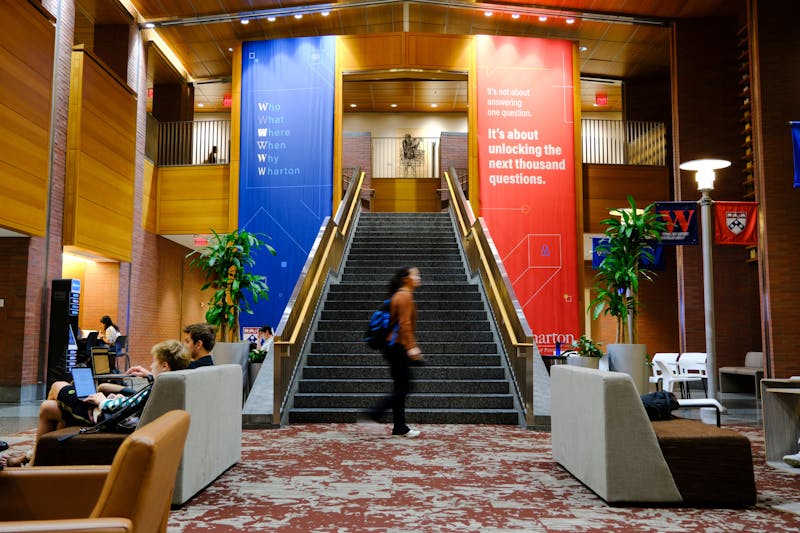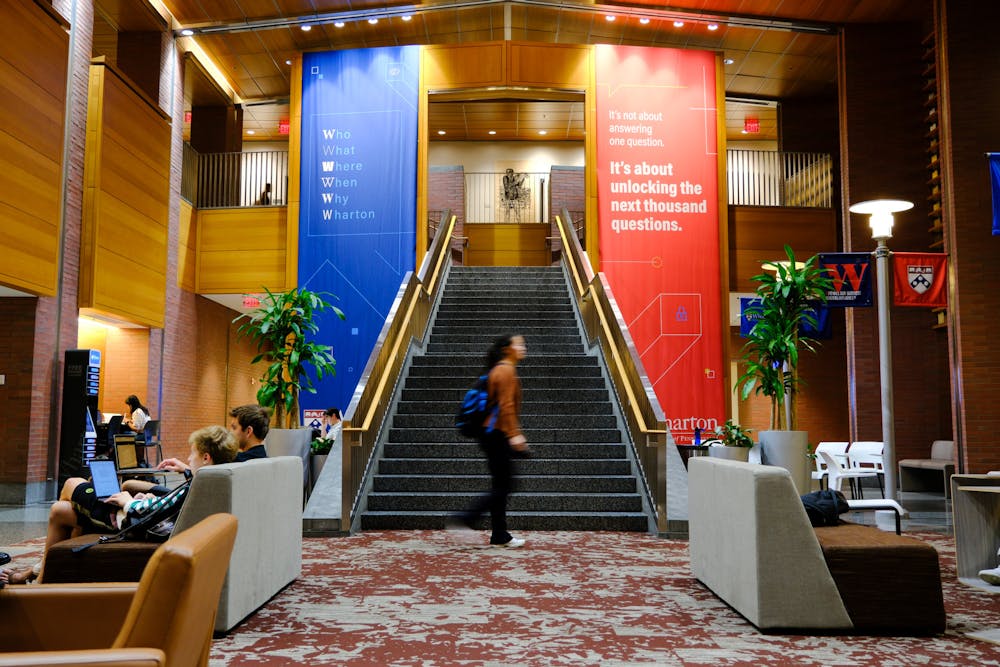Columnist Mallik Arjun Ahluwalia argues that there is more to Penn than Wharton.
Credit: Abhiram Juvvadi
The moment I got into Penn, I formed an immediate conviction. I thought I bore a tacit responsibility to correct anyone who mistook Penn for Penn State. “No, not the one with the Nittany Lions,” I imagined myself saying.
That was the first mistake: thinking the identity crisis was an external one, when, in fact, it was an internal one. I had just been accepted into the College of Arts and Sciences when people, with the well-meaning prescience we reserve for the imagined futures of others, mapped out my path for me. I was going to be a cool, quant-finance guy. I was going to be a Wharton man.
The irony of a university lauded for its interdisciplinary nature is that public and private attention remains overwhelmingly monopolized by its business school.
Wharton’s reputation precedes it. Every career conversation in Huntsman Hall seems to end at the altar of Wall Street. Its alumni form a priesthood of finance, canonized in television lore from “Suits to Billions.’’ It is luminous, but there is peril in its radiance. Too much light, and one begins to believe it is the only illumination.
To be clear, this is not a polemic against Wharton. To vilify it would be too easy. The tragedy is that we have come to believe it is Penn.
The consensus is this: if you go to Penn, you go to Wharton. I experienced this firsthand when my friends asked if I had always wanted to go to business school after I told them I was matriculating at Penn. That’s when Wharton began to occupy more space in my thoughts. A single, innocuous question, and suddenly, my ambitions began to blur into oblivion.
I began to ask myself difficult questions. Is my interest in Wharton sincere, or do I just want to parley in opaque, nearly impenetrable corporate lingo? I could claim that I’m genuinely interested in business. But the illusion of volition is strongest when everyone around you is walking in the same direction. You swear you can swim, but you’re simply following the current. And the crisis is not just Wharton’s dominance. Maybe it is also our subconscious willingness to yield to it.
Is it our fault, though?
If the only valorized form of success at Penn is predicated upon an affiliation with Wharton, then the academic freedom ostensibly afforded to students becomes illusory. And maybe that is the most ironic thing about Penn’s “One University” philosophy. On paper, it is all about access: Take a Wharton class as a College student. Explore the Nursing School if you are in Engineering. Mix and match.
But in practice, that freedom is constrained by coercions of social prestige. It is delimited by the belief that Wharton is the most significant school on campus. You see it everywhere. In the preprofessional clubs that conspicuously append the letter “W” to their names. In the conversations that revolve around consulting recruitment timelines and acronyms you’re meant to decode by osmosis.
It is in this way that the idea of a liberal arts education becomes endangered. As a single school has come to symbolize not merely a field of study but an aspirational identity, the University’s broader intellectual system has begun to contract. The other disciplines have not been formally excluded, but are being insidiously relegated to secondary spheres within the institution.
Critical social inquiry is in decline. This erosion has blunted our impulse to ask who holds power and why. Universities like ours are now siphoning intellectual firepower into the very circuits of privilege they once sought to critique. It is like this that the University has become not the adversary of concentrated power, but its incubator. The migration of Penn’s students to Wharton, then, is also evidence of the hierarchical revaluation of knowledge, wherein disciplines not immediately “marketable” are rendered peripheral, if not obsolete.
Sign up for our newsletter
Get our newsletter, DP Daybreak, delivered to your inbox every weekday morning.
But the opportunity to explore every discipline imaginable is why I am flying to Philadelphia from my hometown in Punjab. Penn will offer me the whole orchard. And when people gesture insistently at one particular golden tree, I hope I remember that I have the freedom to sample its fruit, but I don’t have to climb it if I don’t want to.
Why? Because the courage to walk past the golden tree and follow your own errant hunger, however uncertain its end, is beautiful.
MALLIK ARJUN AHLUWALIA is a College first year from Patiala, India. His email is ahluwal2@sas.upenn.edu.
The Daily Pennsylvanian is an independent, student-run newspaper. Please consider making a donation to support the coverage that shapes the University. Your generosity ensures a future of strong journalism at Penn.

